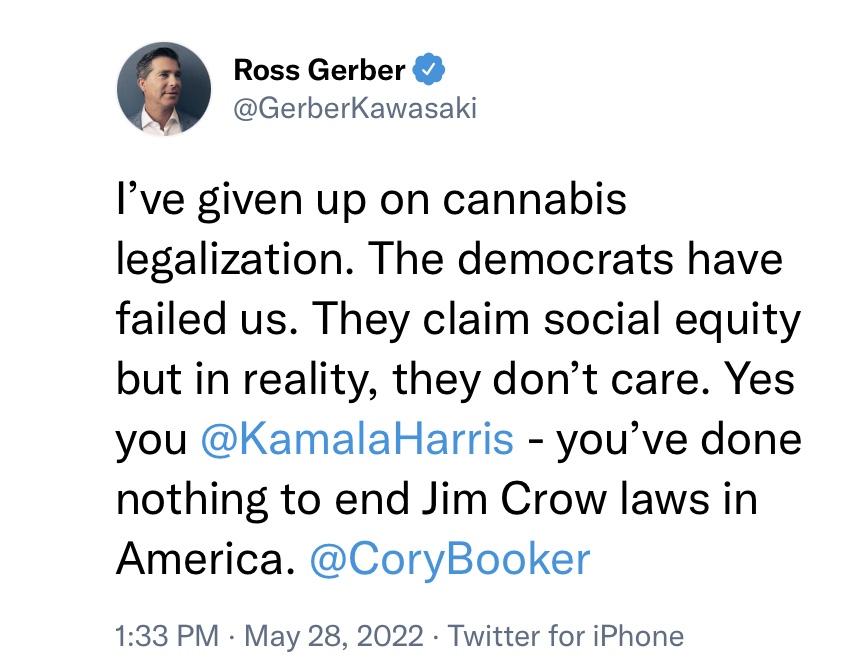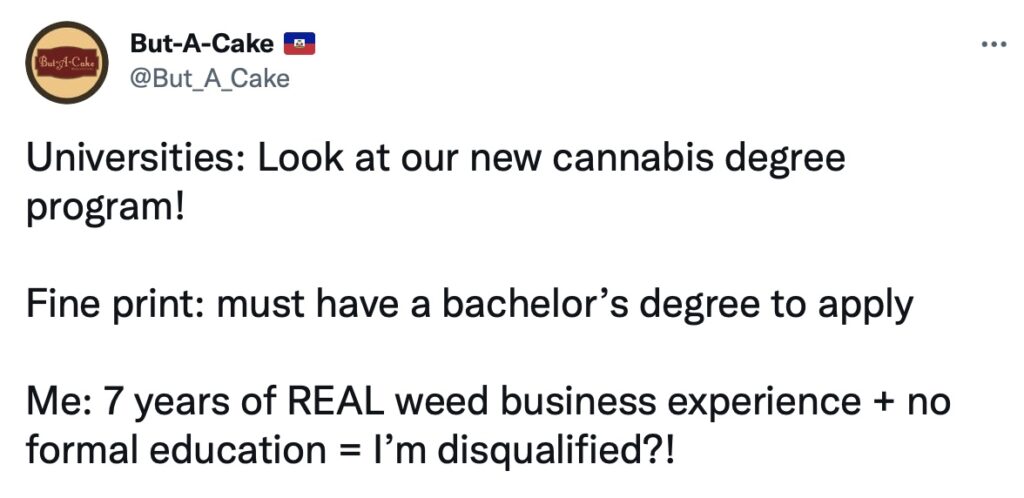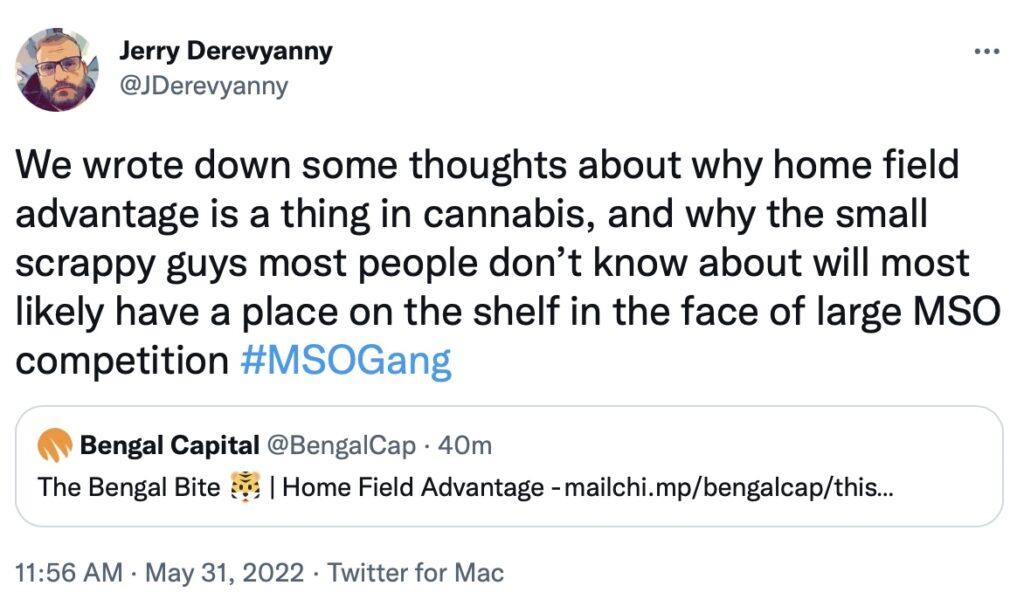31 May 2022 |
No hope for legalization, cannabis education, and brand competition.
By Kaitlin Domangue

This actually made me really sad. Ross’ thoughts sum up what a lot of us are feeling.
After the 2020 election, our space was operating on new & exciting energy. We ended the year on a high note (pun not intended, but not changing it) as we visualized the future and cannabis stocks soared.
And not just for any reason. The Biden Administration was not shy to share their support for cannabis on the campaign trail. But as we know, no action has been taken and we are almost halfway through 2022.
A spokesperson for the President, in 2019, said Biden supports cannabis decriminalization but isn’t going as far as calling for it to be legalized at the federal level.
Biden did tell voters at a New Hampshire event, “Nobody should be in jail for smoking marijuana.”
Though he may not necessarily be gunning for federal legalization, President Biden has expressed support for rescheduling cannabis from Schedule I to Schedule II, which in my opinion still isn’t enough – but even that hasn’t been done.
Ross’s tweet also mentioned Vice President Kamala Harris, who has vocally supported legalizing cannabis and was actually the sponsor of the Marijuana Opportunity, Reinvestment and Expungement (MORE) Act when it was introduced in 2019.
The MORE Act has been deliberated by U.S. lawmakers for several years and has been passed by The House twice. It has yet to pass the Senate.
Since Harris has stepped into her new role as Vice President, she has appeared to flip-flop on her stance – and maybe even before that.
An anonymous aide from Harris’ team told Bloomberg that the Vice Presidents “positions are now the same as Biden’s.” In 2020, before the new administration was voted in, Harris said:
“We have a commitment to decriminalizing marijuana and expunging the records of people who have been convicted of marijuana offenses. When you look at the awful war on drugs and the disproportionate impact it had on black men and creating then criminal records that have deprived people of access to jobs and housing and basic benefits.”
Decriminalization isn’t the same as federal legalization. It just means people won’t be prosecuted for cannabis under a certain amount. But it’s still prohibited by law and there’s no way to legally obtain it.
Vice President Harris was also the California Attorney General beginning in 2011, and at least 1,560 people were sent to prison for cannabis-related offenses during her time in the role.
Her current lack of action makes me wonder if she still holds some of the same opinions as she did then.
What I’m thinking 🧠
There’s been no effort on behalf of the Biden Administration to decriminalize cannabis, much less legalize it at the federal level.
It’s unfathomable that people are in prison for cannabis to this day and our lawmakers aren’t doing much to help.
Vice President Harris has talked more about cannabis legalization than President Biden, even calling for full-on legalization in a 2018 press release.
While I can’t say I’ve given up on cannabis legalization, I truly have given it up for the foreseeable future and those have been my feelings for several months.
I’ve honestly given up on nearly every piece of cannabis legislation that isn’t led by citizens. 🤷♀️ We’ve seen the MORE Act, SAFE Banking, and others circulate Congress too many times without resolve.
The current administration has done next to nothing since taking office to indicate that cannabis legislation, of any kind, is a priority for them.
However – I am not giving up completely. We can’t. I am just giving up on predicting when it might happen or that it will be soon.

Cannabis degree programs are new, as we all know. You surely weren’t finding a college cannabis course, much less an entire degree program, even 10 years ago.
Several universities have added four-year cannabis degrees to their academic roster, including Northern Michigan University, Lake Superior State University, Minot State University, and Colorado State University – Pueblo.
Much of the four-year degrees are focused on plant chemistry. At Lake Superior, which is said to be one of the country’s first four-year degree programs, students will focus “on the the quantitative analysis of cannabis-related compounds and contaminants including THC, CBD, [and] terpenes.”
Like this tweet indicates, some of these programs require a Bachelor’s degree to apply. It’s definitely frustrating to see a pre-requisite excluding a portion of the industry that’s been existing and operating for decades at this point.
But it makes sense in some scenarios. An advanced cannabis chemistry degree requires a base layer of knowledge to build upon. Unless you work in testing or research, you probably aren’t doing much chemistry as part of your daily job.
If you want my opinion: the cannabis industry should stay away from university degree programs. At least right now.
Much of our industry is struggling to be profitable. We are fighting with corporations and anyone who will listen about better wages. Some of this coursework is designed to prepare cutlivators. The average cultivator in the U.S. makes $28,678 a year.
Tell me how that cultivator is supposed to pay back student loans AND would the degree even give them an edge?
I definitely see internships being valuable for cultivators. Commercial cannabis cultivation isn’t a walk in the park and not everything can be taught through coursework alone. There needs to be plenty of hands-on application.
What I’m thinking 🧠
This is why I’m bullish on alternative degrees, especially in cannabis. I didn’t go to college and I do not regret it. A degree doesn’t necessarily guarantee a job anymore. They want a degree + experience.
And when you get a job, it has to be enough to pay back student loans. Much of the cannabis industry isn’t making a living wage, and degree programs won’t change that.
Workweek has an education program and we will actually be buidling out accessible courses from The Green Paper soon.
It’ll be a no-fluff, no BS approach to the cannabis space, in collaborating with subject-matter experts to provide only information that actually matters when you’re working in this industry.

Jerry is a partner at Bengal Capital and as you can see – he shared an article explaining why they think smaller players still have a chance in cannabis, despite large MSO competition.
The article comes with four major points: supply chain, sales contacts, distributed decision making, and regulatory.
The first point says outsiders coming in have a hard time navigating the operators in the supply chain (producers, distributors, etc.). I agree partly with this because local industries know to avoid “that” producer or “that” brand.
I don’t think it’s a large enough disconnect on the MSO side, however, to prevent them from being successful. It might just take a few more tries.
I definitely agree with the second point, which says there is no “kingmaker” like in traditional CPG because of the fragmented market. You have to sell your product license by license and it becomes ultra-competitive. MSO’s aren’t guaranteed a slot in every market like they might be with traditional CPG.
Know the Whole Foods CEO? Until he’s not CEO, you have an in at every Whole Foods in the nation.
Know a cannabis CEO? Cool, you might have like 5 or so ins at retailers, if that? It’s fragmented. Succeess in one market doesn’t mean success in another. For this reason, smaller players have an advantage by proving themselves as a local brand.
Decision making is another point made and I also wholeheartedly agree with this one.
MSOs are often managing teams from miles away and making decisions from miles away. The article compares it to building your house from across the country and being unable to talk to your contractor in person and see what’s being done.
Local teams have the advantage of seeing everything up close and in person all the time. It enhances their ability to make the right call and pivot on a dime.
The fourth point is regulatory. Cannabis is hyperlocal. Period. Regulations change from state to state, but they also change from town to town and county to county.
Locals can effectively get things done because they know the lay of the land and they know the right people. It’s not rare to see a cannabis operator show up at a local board meeting, but 9 times out of 10 they are local to the area.
What I’m thinking 🧠
I think these points, especially the last 3, are incredibly valuable. Small players don’t have to fight for national competition against larger brands.
Also, as I’ve said before, consumers are still in an experimental phase. They aren’t necessarily buying based on brand loyalty. They buy based on THC content, price, and taste. Any brand meeting those marks is sure to see some level of success.
I do wonder what the impact will be, if any, on small operators when federal legalization arrives and interstate commerce potentially comes online.